The department offers a program of studies leading to the Ph.D. degree.
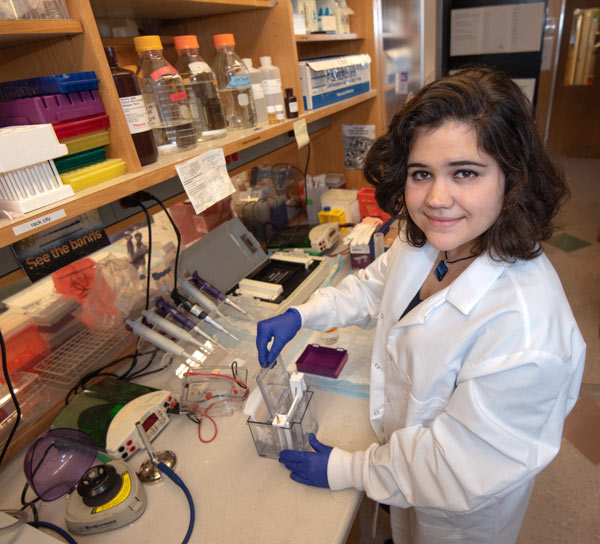
Students generally enter the program with a bachelor’s degree in science, or with a masters or advanced degree in medicine or veterinary science. Typically four or five years are required to complete the Ph.D.; the first two years being primarily devoted to course work and the remaining to full-time dissertation research. During their third year, the student takes a preliminary exam and advances to candidacy for the Ph.D. degree. Dissertation work culminates in a written dissertation that the student defends orally before their Ph.D advisory committee. Many of our students are also members of interdepartmental programs: Cell and Molecular Biology, Integrated Program in Toxicology, and the Medical Scientist Training (M.D.-Ph.D.) program. These programs encourage access to researchers throughout the University and facilitate the interdisciplinary studies that have proven so successful at Duke.
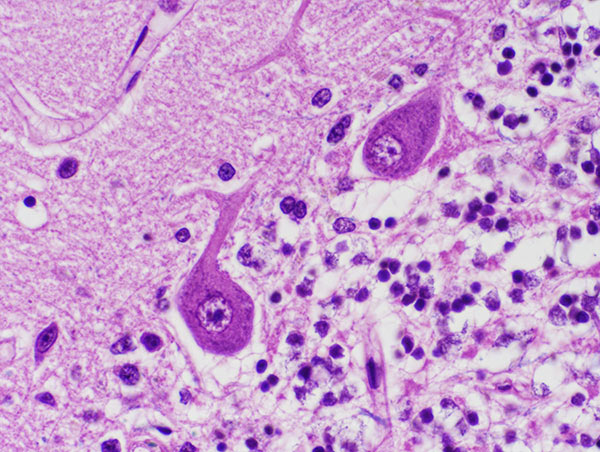
Course Descriptions
During the first and second years, suggested courses include core courses in histology and pathology, a departmental course on molecular aspects of disease, and various elective courses offered by the different Basic Science Graduate Programs at Duke. In view of the wide diversity in the scope of research offered by our graduate faculty, we have kept mandatory courses to a minimum so that education can be tailored to each student’s individual research topic requirements. Our mandatory core courses are comprised of the following:
Basic Biology of Cells as a Function of Age; Implication for Disease (PATHOL787D, 3 units), Dr. Malek and Dr. Liton
The objective of this course is to review the fundamentals of cell biology as a function of age and their contribution to pathologies associated with age-related diseases. This course will cover a wide range of principles, including concepts and theories of aging, impact of aging on cell regulation and signaling, metabolism and epigenetics, relevant in vitro and in vivo experimental models, and potential anti-aging therapies. The course format will involve a combination of lectures and journal club style sessions, in which students will have the opportunity to hone their analytical and critical thinking skills while evaluating current literature.
Introduction to Systemic Histology, (PATHOL725, 3 units). This course provides a basic foundation in identification of human and murine tissue types, using a lecture-laboratory format. Since 2005, the laboratory has been offered using virtual microscopy. This allows all students to view the same slide at a variety of magnifications using their own laptop computer. In addition to being taken by pathology graduate students, the course has been highly subscribed to by graduate students outside of the department, attesting to the quality of both the material and the teaching offered.
Animal Models in Translational Research (PATHOL 735S, 3 units). The goal of this course is to give students a working knowledge of the use of animal models in research, types of models and how to choose for translational relevance. Topics include the regulations governing the use of animals in research, principles of in vivo experimental design, as well as best practices for data collection, interpretation and reporting during animal study conduct. Students will be exposed to the principle elements that impart variability and bias in the generation of animal study data, and will learn best practices for the conduct of high quality animal studies that lead to reproducible data.
General Pathology (PATHOL750, 3 units). This course provides a basic introduction to pathology, organized around general pathologic processes. These include cell death and response to injury, hemodynamic/vascular processes, infectious, inflammatory, and immunologic diseases, neoplasia, environmental, nutritional, and genetic diseases. Completion of the PATHOL725 histology course is a prerequisite for this course. Most of the students who take the PATHOL725 prerequisite course go on to take this course as well. The material covered is similar to what is covered in a medical school pathology course, but with stronger emphasis on basic science mechanisms causing disease, rather than diagnostic considerations. The course also incorporates a lecture-laboratory format. Laboratory sessions involve microscopic examination of diseased tissues using virtual microscopy and gross examination of human organ specimens.
Molecular Aspects of Disease (PATHOL785, 3 Units). The goal of this course is to expose students to basic techniques of molecular biology and to gain an understanding for the molecular basics of specific diseases. This course has a paper-discussion format, where papers selected by various pathology graduate faculty are presented and discussed in detail by teams of student. These discussions are moderated by faculty.
Translational Aspects of Pathobiology (PATHOL786.01, 3 Units) TRANS ASPECTS OF PATH
This Graduate Medical Education (GME) course reflects Duke University's unique integration of traditional basic science research with experimental therapeutics in an environment that seeks to bridge the basic sciences and clinical medicine for translational purposes. Students will have an excellent opportunity to gain valuable new information into latest developments of translational research and to be instructed by leaders in this field from Duke, local academic institutions and biotechnology industry. For those interested in pursuing a career in translational medicine or industry, this course will provide an overview of the relevance and scope of translational research.
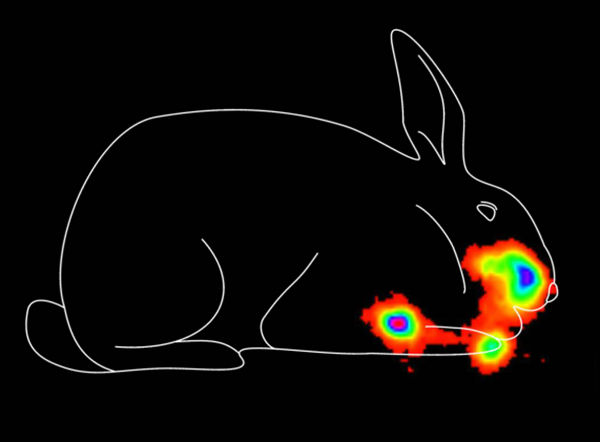
Graduate Student Seminar (PATHOL855, 3 Units). This is a year-long course where each graduate student gives a presentation on his/her research in a formal setting to their peers and Pathology Graduate faculty. All Pathology graduate students are required to register for this course each semester throughout their training. Typically, 1st and 2nd year graduate students get 30 min time slots but more senior students are given 1 hr. time slots. Different aspects of presentations by the students (e.g. introduction, significance, quality and rigor of data, validity of conclusions, quality of slides, delivery style, etc.) are anonymously assessed by everyone in the audience, using critique sheets that are provided to the graduate student’s mentor for review with students. A sample of a critique sheet is supplied (Appendix II). As a result of the strong emphasis on the importance of oral presentation of research, remarkable improvements in the quality and contents of student presentation have been observed each year. Students are responsible for registering for this course each fall and spring semester.
Elective Courses. A wide range of electives are offered to our graduate students to select from. Students usually take 8 - 12 units of courses per semester in Years 1 and 2. Some of the more popular electives are IMMUNOL544 (3 units) Principles of Immunology, CELLBIO760 (3 units) Cellular Signaling, CMB778 (4 units) Genetic Approaches to the Solution of Biological Problems, MOLCAN819 (2 units) Cancer as a Disease. Others include CELLBIO204 (3 units) Cell and Molecular Physiology, CMB658 (2 units) Structural Biochemistry 1 (half semester course), PHARM533 (4 units) Essentials of Pharmacology and Toxicology, IMMUNOL800 (3 units) Comprehensive Immunology, IMMUNOL900 (2 units) Tumor Immunology, IMMUNOL 252 (3 units) Virology, MGM282 (3 units) Microbial Pathogenesis, and PHARM755 (3 units) Neurotoxicology.
By the end of the second year, students have usually completed the required number of non-research course credits and gained a sound theoretical basis for their experimental studies. At this stage students are required to decide upon a thesis project and prepare a written proposal in the form of a grant application. The defense of this proposal before a committee of five faculty members constitutes the preliminary examination (described below in greater detail).
Mentoring
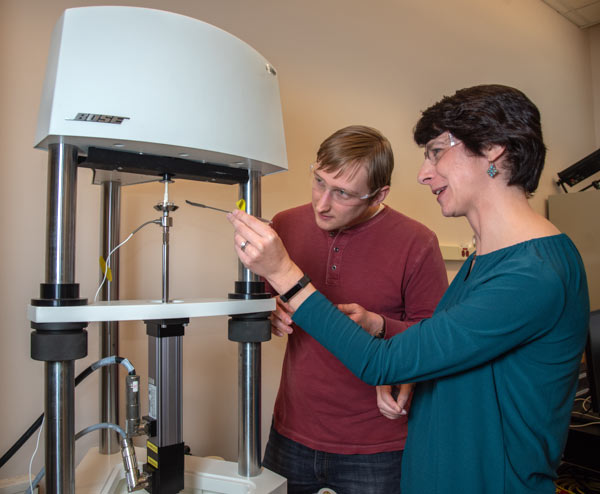
Upon arriving at Duke, new students are advised by Dr. Abraham, the Director of Graduate Studies (DGS) regarding rotation choices, course work, or other academic issues. The students also meet with the DGS after each rotation to discuss the outcome and to consider alternate options, if needed. Before a student finally settles on prospective rotation laboratories, they are encouraged to survey and contact various faculty regarding research opportunities available among the primary and secondary graduate faculty of the program. The DGS continues to serve as counselor/advisor to students even after they have selected a laboratory. The DGS reviews and approves student thesis committee and deals with a wide variety of student problems and concerns. When students are uncomfortable discussing concerns with their lab mentors or faculty members who exercise official oversight of their progress, the DGS serves as the graduate student ombudsman and will intervene on behalf of the student. Assisting the DGS is the DGS Assistant, Mrs. Margaret Atchison,(Barker), who serves as full-time administrator for the Graduate Program in Pathology. Mrs. Atchison oversees the substantial administrative responsibilities of the program. She also serves as a resource for students and faculty and as a liaison to the administrative staff at the Duke Graduate School. She and Pamela Harris, the Financial Analyst for the Department of Pathology, provide administrative help and financial guidance.
Graduate Student Committee
As soon as the student has defined his/her major area of investigation, an advisory committee is selected by the graduate student in consultation with his/her principal advisor. This committee, which is subject to approval by the Director of Graduate Studies and the Dean of the Graduate School, consists of at least 4 members of Duke Graduate Faculty including the dissertation advisor. There must always be at least 2 committee members from the Pathology Graduate Faculty, with three from the primary research field/area, and one called the minor area representative, must represent a minor area in relation to the student’s research. In order to attain the desired maturity and balance required of the committee, at least 2 members of the committee must be of the rank higher than Assistant Professor. At least two members of the committee, including the chair, must be faculty in the Pathology department. The principal advisor of the graduate student acts as the Chairman of the committee.
It is the responsibility of the graduate committee both to evaluate the progress and direction of the student’s research and to plan the student’s program during the remainder of his/her training period. It is recommended that this committee should counsel students to take advantage of the diversity of educational experiences available in other departments and to take or audit advanced courses and tutorials in specialized areas of interest. The graduate committee functions in both an advisory and in an evaluatory capacity with the responsibility of recommending that, in the event that the student does not show sufficient research aptitude, the student should either withdraw from the graduate program or seek to obtain a terminal Masters degree. This same committee is the student’s preliminary examination committee and examines the student on his/her doctoral dissertation research topic. Each student meets with his/her graduate committee at least once per year. A brief report summarizing the meeting is prepared and submitted to the DGS after it is signed by the thesis advisor. More frequent (e.g. 3 - 6 month) meetings often occur in the student’s final year of research.
Preliminary Exam
The preliminary examination is typically scheduled at the beginning of the third year. This proves adequate time for the student to develop and validate the major tenets of their proposal since the preliminary exam is based on the research topic that the graduate student has selected for his/her thesis project. It is recommended that an initial meeting with the committee be held at least six weeks prior to the scheduling of the preliminary examination. The purpose of this meeting is to discuss the performance of the student in the classroom and the progress and direction of his/her research. Each student is required to write a proposal describing their proposed Ph.D. research project in the format of an NIH grant proposal. This proposal is submitted to the student’s advisory committee at least 10 days prior to the date of the qualifying exam. The written part of the qualifying exam normally consists of 4 questions, one contributed by each member of the advisory committee other than the mentor. Committee members are encouraged to provide 2 questions; if 2 questions are provided, the choice of which question to answer for the written portion of the exam rests with the student. The questions asked are derived from the student’s proposal or may explore topics in disease pathogenesis, physiology and cell and molecular biology unrelated to the student’s proposal. Answers to the written portion of the qualifying exam are received by each respective committee member prior to the scheduled qualifying exam committee meeting.
At the scheduled qualifying exam committee meeting, advisory committee members decide whether the student’s performance on the written preliminary portion of the qualifying exam is adequate. At the discretion of the committee, the student may be directed to repeat the written exam after additional coursework and study rather than proceeding directly to the oral portion of the exam. The oral examination is based upon the content of the Ph.D. proposal and the written preliminary portion of the qualifying exam. The exam should be scheduled for a minimum of 2.5 hours and the exam room reserved for 3 hours. This ensures the student that the committee members will save adequate time to give careful consideration to the content of the proposal. The preliminary examinations are conducted under the rules of the Graduate School, with at least 4 affirmative votes (out of the 5 committee members) being required for passing. The voting to pass or fail the student at the preliminary examination will be by written secret ballot. Students with adequate performance on both written and oral portions of the qualifying exam are admitted to candidacy for the Ph.D. degree.
If a student fails the preliminary examination, he/she may apply, with the consent of the student’s graduate committee and the Dean of the Graduate School, for permission to take a second examination no earlier than 3 months from the first. Students with unsatisfactory performance on the oral or on both oral and written portions of the second preliminary exam are considered as candidates for the Masters degree only.
Thesis Defense & Dissertation
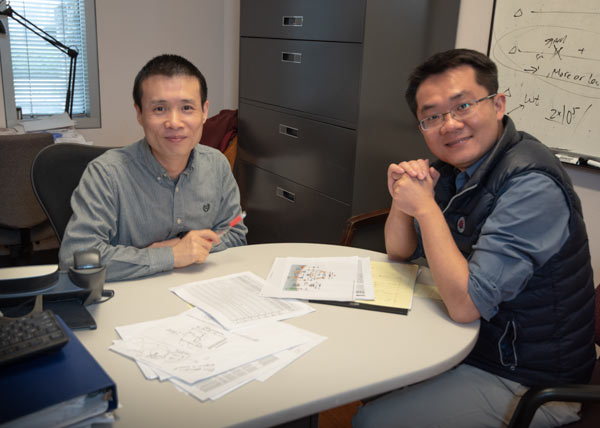
At least 2 months prior to the scheduling of the Ph.D. dissertation defense examination, the student seeks a meeting of his/her graduate committee to gain approval from the entire committee to proceed with preparations for the initial defense. The Chairman of the committee notifies the student and the Director of Graduate Studies of the committee’s decisions. The student also notifies the Graduate School of his/her intention to graduate. The final Ph.D. dissertation embodies the results of significant original research and is expected to be written in a mature and competent style. Basic requirements for preparing the dissertation and for its defense are as described by the Graduate School in their website. Copies of the Guide for the Preparation of Theses and Dissertations are also available from the Director of Graduate Studies. Normally, the dissertation is presented and accepted within 2-3 calendar years after the preliminary examination is passed. According to regulations of the Duke University Graduate School, should the dissertation not be submitted and accepted within 4 years after examination, the candidate, with the approval of the committee, may petition the Dean of the Graduate School for an extension of up to one year. If this extension is granted and the dissertation is not submitted and accepted by the new deadline, the student will be dropped from candidacy. As part of the thesis defense is a dissertation seminar. It is the responsibility of the student and his/her mentor to schedule this seminar at a time that will ensure maximum attendance by members of the department and university community. No thesis defense (or preliminary examination) can be scheduled when University classes are not in session.